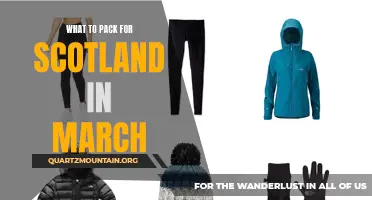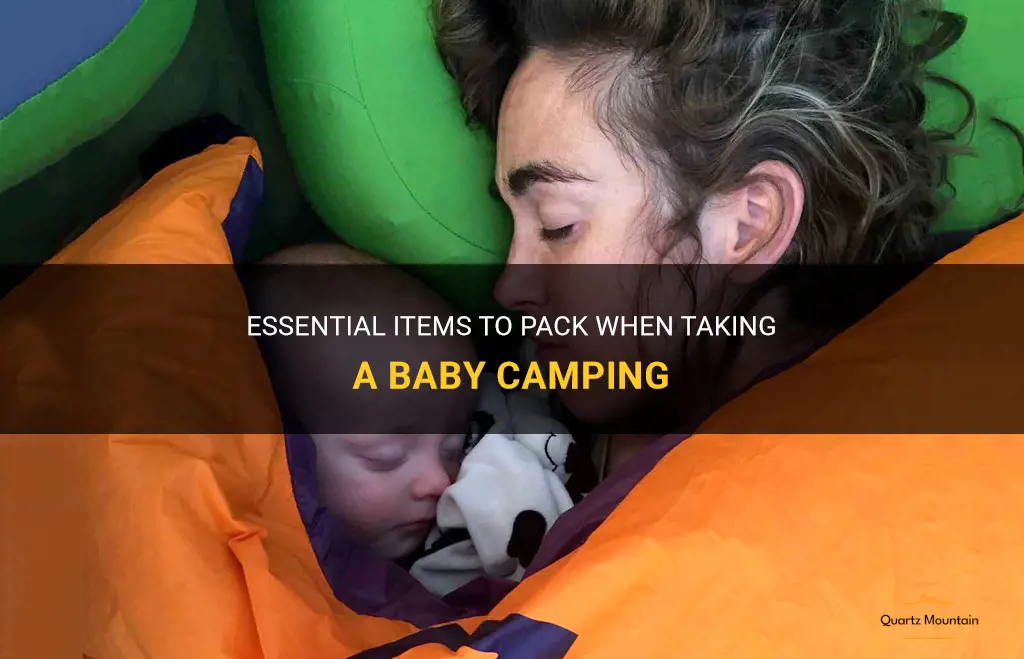
Camping with a baby can be an unforgettable experience, but it also requires careful planning and packing. From ensuring their comfort and safety to keeping them entertained and well-fed, there are a handful of essential items to pack when taking a baby camping. With the right gear and preparation, you can create lasting memories in the great outdoors while keeping your little one happy and content.
| Characteristics | Values |
|---|---|
| Clothing | Extra onesies, socks, and sleepers |
| Diapers | Disposable or cloth |
| Wipes | Biodegradable |
| Bedding | Waterproof crib mattress pad |
| Sleeping | Baby sleeping bag or portable crib |
| Feeding | Bottles, formula, and baby food |
| Utensils | Baby spoons and bowls |
| High chair | Portable or attachable to a chair |
| Bathing | Baby bathtub or collapsible bucket |
| Towels | Soft and absorbent |
| Sun protection | Sunscreen and sun hat |
| Bug repellent | Baby-safe options |
| First aid kit | Baby-specific items and medications |
| Toys and books | Age-appropriate and safe |
| Baby carrier | Ergonomic and comfortable |
| Stroller | Lightweight and compact |
| Extra clothes | In case of accidents or spills |
| Blankets | For warmth and comfort |
| Entertainment | Portable crib mobile or music player |
What You'll Learn
- What essential items should be packed when taking a baby camping?
- Are there any specific safety items that should be included in a baby's camping gear?
- How can parents best ensure their baby's comfort while camping?
- Are there any specific clothing or diapering items that should be packed for a baby camping trip?
- What are some tips for handling food and mealtime when camping with a baby?

What essential items should be packed when taking a baby camping?
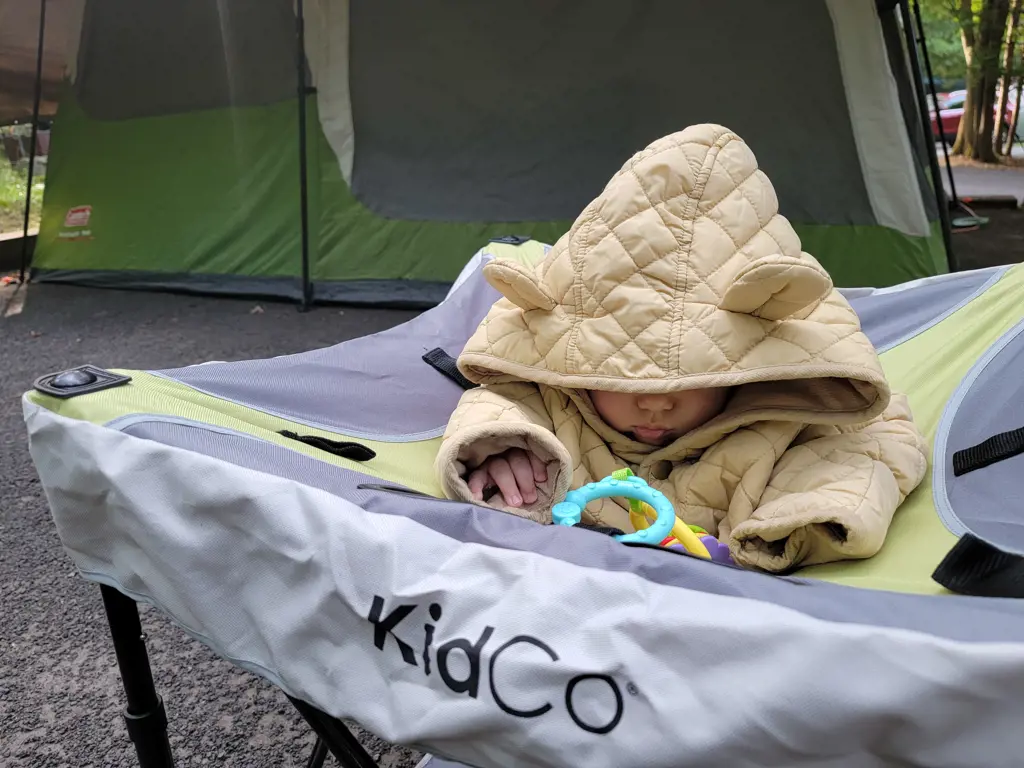
When going camping with a baby, it's important to be prepared and pack all the essentials to ensure a successful and enjoyable trip. Here are some essential items that should be packed when taking a baby camping:
- Tent: A spacious tent with proper ventilation is a must when camping with a baby. Look for a tent that is easy to set up and has enough room for a crib or a playpen to ensure that the baby has a safe and comfortable sleeping area.
- Sleeping gear: Pack a comfortable sleeping bag or a crib for the baby to sleep in. It's important to choose a sleeping bag that is suitable for the weather conditions and provides enough warmth for the baby.
- Baby carrier or stroller: A baby carrier or stroller is essential for when you're hiking or exploring the campsite. It allows you to keep your hands free while still keeping the baby close and secure. Look for a carrier or stroller that is comfortable for both you and your baby and can handle rough terrains.
- Clothing: Pack enough clothing for the baby, keeping in mind the weather conditions at the campsite. It's important to have layers of clothing to ensure that the baby stays warm during the cooler evenings and nights. Don't forget to pack extra socks, hats, and mittens to protect the baby from the elements.
- Diapers and wipes: It's crucial to pack enough diapers and wipes for the duration of your camping trip. Depending on the length of your trip, you may need to bring a portable diaper disposal system or find a place to dispose of them properly.
- Baby food and bottles: If your baby is not exclusively breastfed, it's important to pack enough baby food, formula, and bottles. Consider packing lightweight and non-perishable options that are easy to prepare and don't require refrigeration.
- First aid kit: A well-stocked first aid kit is essential when camping with a baby. It should include items such as band-aids, antiseptic ointment, thermometer, baby-safe insect repellent, and any necessary medications.
- Sun protection: Don't forget to pack sunscreen with a high SPF specifically designed for babies, a hat to protect their delicate skin, and sunglasses to shield their eyes from the sun's harmful rays. It's also important to find shaded areas or use a portable sunshade to protect the baby from direct sunlight.
- Baby-friendly bug repellent: Camping often means being exposed to bugs and insects. Look for a baby-friendly bug repellent that is safe and effective in protecting the baby from mosquito bites and other insects.
- Entertainment and comfort items: Remember to pack the baby's favorite toys, books, and comfort items to keep them entertained and comforted during the camping trip. These can help soothe the baby during nap times or when they need a distraction.
Taking a baby camping can be a wonderful experience for the whole family. By packing these essential items, you can ensure that your baby is safe, comfortable, and well taken care of during your outdoor adventures. Remember to always prioritize your baby's needs and safety when planning a camping trip.
Essential Items to Pack for a 7-Day Mediterranean Cruise
You may want to see also

Are there any specific safety items that should be included in a baby's camping gear?
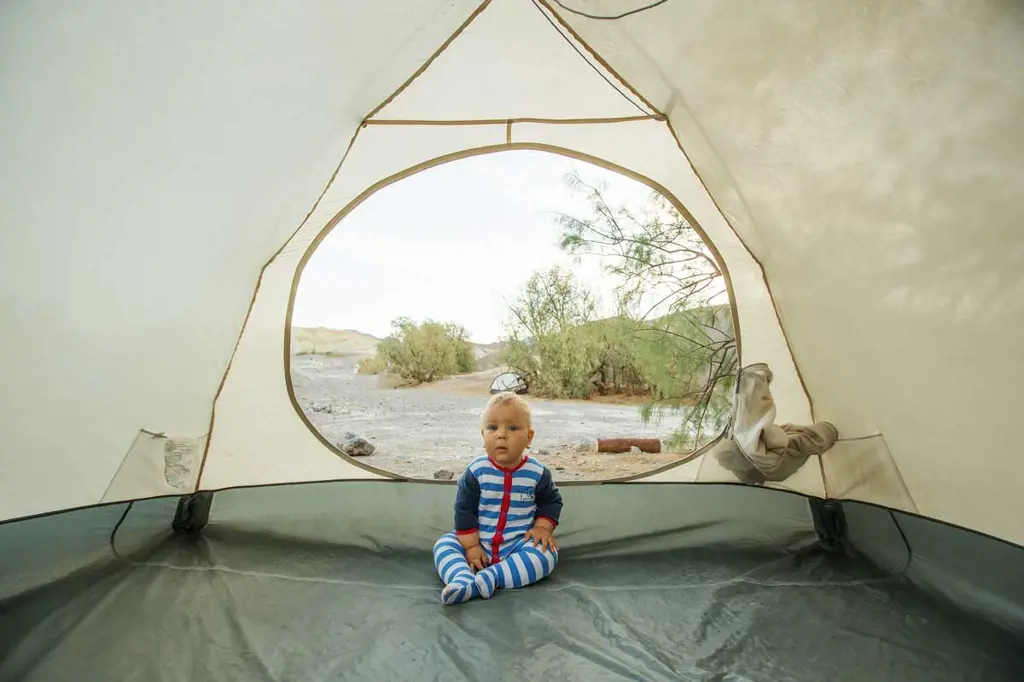
When it comes to taking your baby camping, safety is the number one priority. While enjoying the great outdoors, there are some specific safety items that should be included in your baby's camping gear to ensure their well-being. In this article, we will discuss some essential safety items that every parent should consider when bringing their baby camping.
- Tent with UV protection: When camping with a baby, it's crucial to protect their delicate skin from harmful UV rays. Look for a tent that provides UV protection to shield them from the sun. This will help prevent sunburns and minimize the risk of skin damage.
- High-quality baby carrier: A reliable baby carrier is a must-have when camping. Opt for a carrier that offers proper back and neck support for your baby. It should also have adjustable straps to ensure a comfortable fit for you. A baby carrier allows you to explore nature while keeping your little one close and secure.
- Baby sleeping bag: Investing in a baby sleeping bag designed for camping is essential. These sleeping bags are lightweight, breathable, and provide the right amount of insulation for different weather conditions. Make sure the sleeping bag is the right size for your baby to prevent suffocation hazards. Always follow the manufacturer's guidelines when choosing and using a baby sleeping bag.
- Insect repellent: Being in nature also means encountering insects. Protect your baby from mosquito bites and other insects by using a baby-safe insect repellent. Choose a repellent that is DEET-free and suitable for infants. Apply it to exposed skin areas, keeping it away from their hands and eyes.
- First aid kit: Accidents can happen, even during a camping trip. Make sure you have a well-stocked first aid kit that includes essential items such as bandages, antiseptic wipes, tweezers, and fever reducers suitable for infants. Familiarize yourself with basic first aid techniques and how to handle common camping injuries, such as scrapes, bug bites, or sprains.
- Sunhat and sunscreen: Protecting your baby's skin from the sun is crucial. A wide-brimmed sunhat will help shield their face and neck from direct sunlight. Additionally, apply a baby-safe sunscreen with a high SPF to exposed skin areas, making sure to reapply as directed. Remember that babies under six months of age should be kept out of direct sunlight whenever possible.
- Baby-safe camping gear: When choosing camping gear such as chairs, table, or camping stove, ensure they are baby-safe. Look for stable and sturdy items that won't topple over easily. Keep hot items and sharp objects out of the baby's reach to prevent accidents. Consider bringing a portable playpen or a baby gate to create a safe space for your little one.
- Portable high chair: If your baby is already eating solids, a portable high chair is a handy item to have. Look for a lightweight and compact design that can easily be folded and transported. A portable high chair will provide a safe and clean place for your baby to sit and eat, whether at the campsite or during meals on the go.
- Baby monitor: While camping, it's important to have a reliable way to monitor your baby's sleep. A portable baby monitor allows you to keep an eye on your little one even when they are sleeping in a separate tent or at a distance from your campsite. Look for a monitor with a long-range and a clear audio signal for optimal safety.
Remember, every baby is different, and their specific needs may vary. Adapt your camping gear and safety items based on your baby's age, physical abilities, and any unique requirements they may have. Always prioritize your baby's safety and consult with your healthcare provider or a camping expert for further guidance and specific recommendations. With the right safety items and precautions in place, you can enjoy a safe and memorable camping experience with your little one.
Essential Items to Pack for a Two-Week Holiday
You may want to see also

How can parents best ensure their baby's comfort while camping?
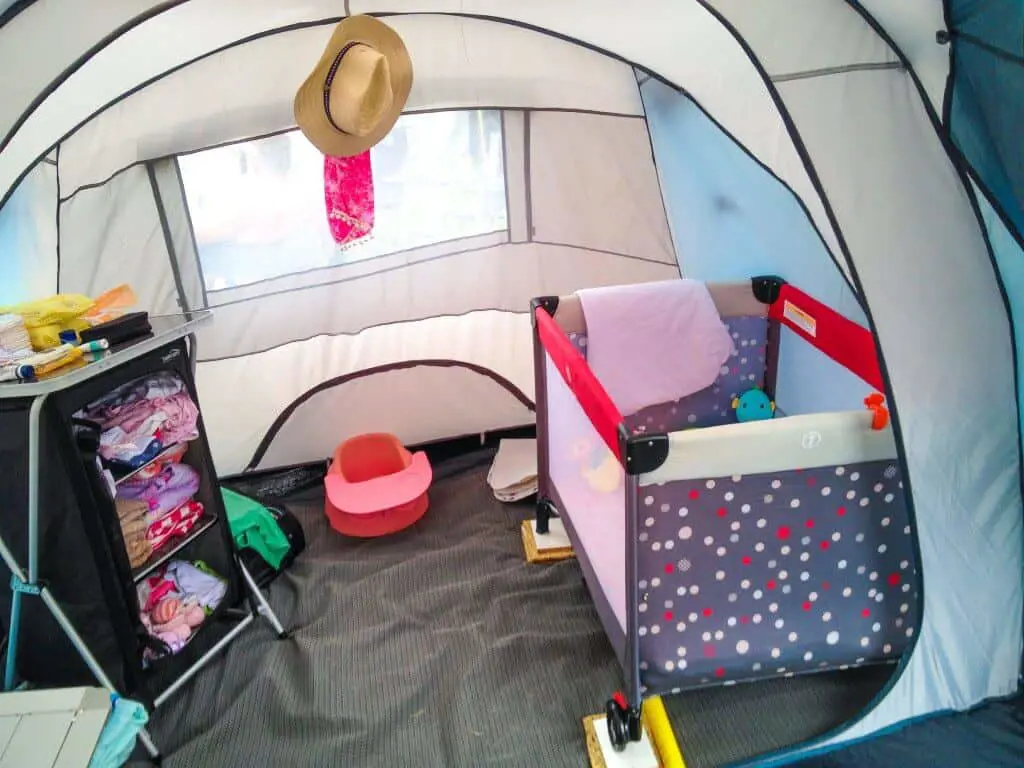
Camping with a baby can be a fun and rewarding experience for the whole family. However, it's important for parents to take certain steps to ensure their baby's comfort while camping. Here are some tips to help parents best ensure their baby's comfort during a camping trip.
- Choose the Right Campsite: When camping with a baby, it's important to choose a campsite that offers amenities such as clean and accessible restrooms, showers, and possibly even laundry facilities. This will make it easier for parents to take care of their baby's needs, such as changing diapers and washing clothes. Additionally, parents should look for a campsite that offers a shaded area, as it will help protect their baby from the sun and keep them cool.
- Pack Essentials: Before heading out on the camping trip, parents should make a checklist of essential items they will need for their baby. This can include items such as diapers, wipes, extra clothing, blankets, a portable crib or playpen, a baby carrier, and any medications or special items their baby may need. It's important to pack enough supplies to last the entire duration of the camping trip, as it may be difficult to find these items in remote camping areas.
- Create a Safe Sleeping Environment: Babies need a safe and comfortable place to sleep, even while camping. Parents can bring a portable crib or playpen for their baby to sleep in. It's important to set up the crib or playpen in a safe area, away from any potential hazards such as campfires or uneven ground. Additionally, parents should bring along a comfortable sleeping bag or blanket to keep their baby warm and cozy during the night.
- Protect from Insects: Camping often means being exposed to bugs and insects. To ensure their baby's comfort, parents should take steps to protect them from insect bites. This can be done by using baby-safe insect repellent, dressing their baby in long-sleeved clothing and pants, and using mosquito netting over the crib or playpen. It's also a good idea to avoid camping near stagnant water, as it is a breeding ground for mosquitoes and other bugs.
- Plan for Feedings: If the baby is bottle-fed, parents should pack enough formula and bottles for the duration of the camping trip. It's also a good idea to bring a cooler with ice packs to keep the formula cold. If the baby is breastfed, parents can bring a portable breast pump or plan for more frequent breaks for nursing. It's important to find a comfortable and private spot for breastfeeding to ensure the baby's comfort and privacy.
- Dress Appropriately for the Weather: Weather conditions can vary during a camping trip, so parents should pack clothing appropriate for different temperatures and weather conditions. Layering is key, as it allows parents to easily adjust their baby's clothing as needed. Additionally, parents should pack hats and sunscreen to protect their baby's delicate skin from the sun.
- Maintain a Routine: Babies thrive on routines, so it's important for parents to try and maintain their baby's regular sleep and feeding schedule as much as possible while camping. This can help ensure their baby's comfort and minimize any disruptions to their daily routine.
In conclusion, parents can best ensure their baby's comfort while camping by choosing the right campsite, packing essential items, creating a safe sleeping environment, protecting them from insects, planning for feedings, dressing appropriately for the weather, and maintaining a routine. By taking these steps, parents can ensure that their baby has a comfortable and enjoyable camping experience.
Essential Items to Include in Your PGL Packing List
You may want to see also

Are there any specific clothing or diapering items that should be packed for a baby camping trip?
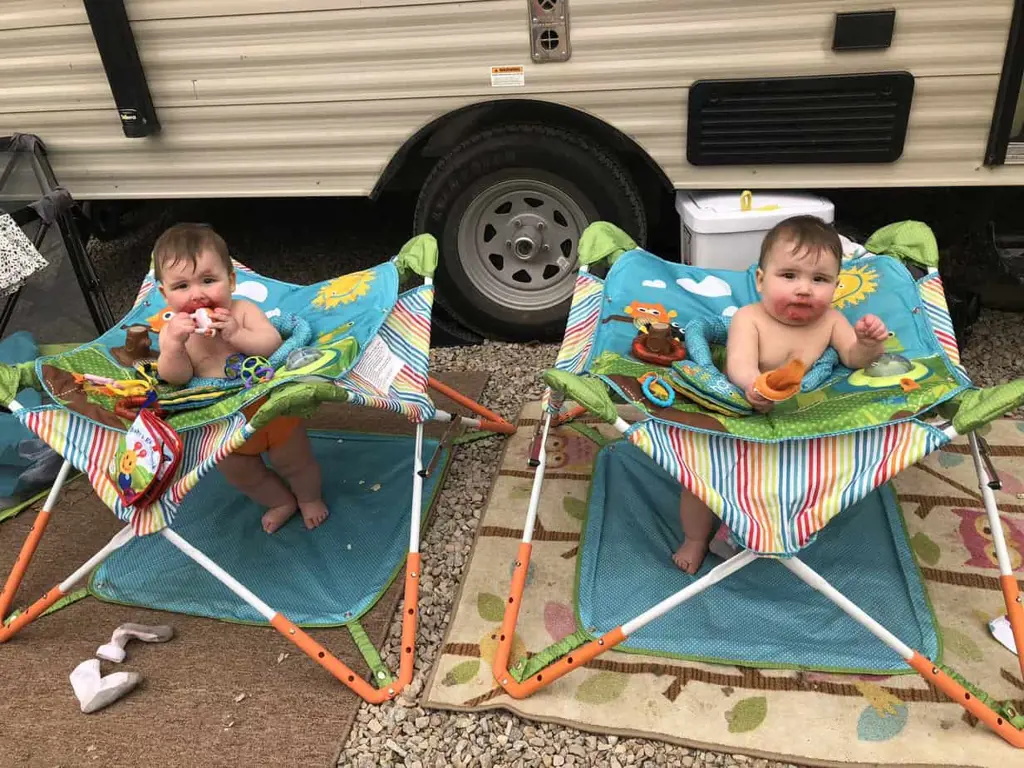
When planning a camping trip with a baby, it is important to pack the right clothing and diapering items to ensure their comfort and well-being throughout the trip. Here are some specific items that should be included in your packing list:
Clothing:
- Layers: Since weather conditions can change rapidly, it is essential to pack multiple layers of clothing for your baby. This allows you to add or remove clothing as needed to regulate their body temperature. Make sure to include onesies, long-sleeved shirts, pants, jackets, hats, and socks.
- Sleepwear: Pack comfortable sleepwear for your baby. Look for sleepers or pajamas made of breathable fabrics, such as cotton, to keep them cozy during the night.
- Swimsuit: If you plan on camping near a lake or other water bodies, don't forget to bring a swimsuit for your baby. It will allow them to enjoy the water and stay cool on hot days.
- Bug-repellent clothing: Depending on the location and time of year, insects can be a nuisance. Consider packing clothing treated with insect repellent or bring separate bug repellent for your baby to keep them protected.
Diapering items:
- Diapers: Pack enough diapers to last for the entire duration of your camping trip. Consider bringing a few extra, as unexpected situations may arise.
- Wipes: Bring a sufficient supply of baby wipes to keep your baby clean and fresh throughout the trip.
- Diaper cream: To protect your baby's skin from diaper rash, include a tube of diaper cream in your packing list. Choose a gentle and hypoallergenic cream that is suitable for your baby's delicate skin.
- Changing pad: A portable changing pad is a must-have item for camping trips. It provides a clean and safe surface for diaper changes, even when you are outdoors.
- Disposable bags: To dispose of dirty diapers and wipes, pack a few disposable bags. They help contain the odor and make it easier to keep your camping area clean.
Additional tips:
- Opt for lightweight and quick-drying fabrics to minimize the amount of clothing you need to pack and to make laundry easier if necessary.
- Bring a few extra sets of clothes in case of accidents or spills.
- Consider the terrain and climate of your camping destination when choosing clothing. If you will be hiking or camping in rugged areas, pack durable and comfortable clothing for your baby.
- Don't forget to bring hats and sunscreen to protect your baby from the sun's harmful rays.
In conclusion, packing the right clothing and diapering items is essential to ensure your baby's comfort and well-being during a camping trip. By including layers of clothing, suitable sleepwear, bug-repellent clothing, and essential diapering items, you can enjoy a stress-free and enjoyable experience with your baby in the great outdoors.
Tips on what to avoid packing when traveling to Japan
You may want to see also

What are some tips for handling food and mealtime when camping with a baby?
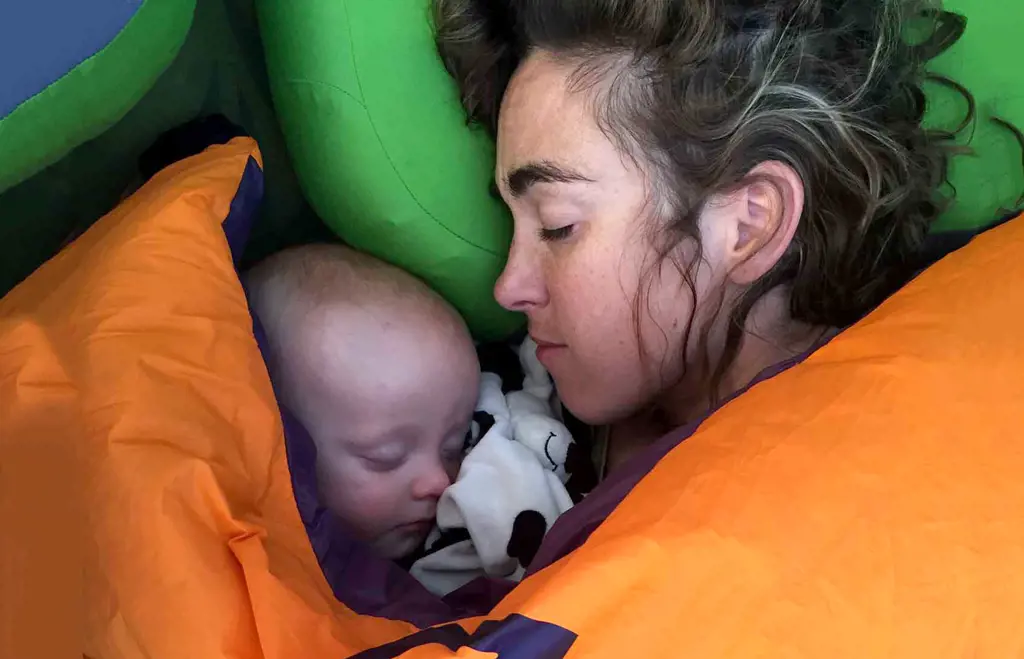
Camping with a baby can be a fun and rewarding experience for the whole family. However, it does require some special considerations when it comes to handling food and mealtime. Here are some tips to help you navigate this important aspect of camping with a baby:
- Plan and prepare meals in advance: One of the keys to a successful camping trip with a baby is being prepared. Before you even leave home, plan out your meals and make a shopping list of all the ingredients you will need. This will ensure that you have everything you need on hand and reduce stress when it comes time to cook.
- Pack enough food and snacks: Babies have small stomachs and can get hungry frequently. It's important to pack enough food and snacks to keep them satisfied throughout the trip. Bring a variety of options such as pre-packaged baby food, finger foods, and formula or breast milk if needed. Don't forget to pack plenty of water or other beverages to keep your baby hydrated.
- Choose easy and nutritious meals: When camping with a baby, it's best to choose simple and nutritious meals that are easy to prepare. One-pot meals such as soups, stews, and pasta dishes are great options. They can be made ahead of time and reheated over the campfire or stove. Packing fresh fruits and vegetables that don't require refrigeration, such as apples, bananas, and carrots, is also a good idea.
- Practice good food hygiene: Food hygiene is crucial when camping, especially when you have a baby in tow. Make sure to wash your hands thoroughly before handling any food and use an appropriate food preparation area. Keep raw meats and other perishable items in a cooler with plenty of ice to prevent spoilage. If you are breastfeeding, make sure to maintain good breast hygiene and follow safe storage guidelines for breast milk.
- Use portable and baby-friendly feeding utensils: When camping with a baby, it's important to have the right utensils to make mealtime easier. Portable utensil sets specifically designed for babies are available and can be a great option. These sets typically include a spoon, fork, and bowl with a lid. They are lightweight, easy to clean, and can be easily packed into your camping gear.
- Create a comfortable feeding area: Creating a comfortable feeding area for your baby can help make mealtime more enjoyable for both of you. Bring a portable high chair or booster seat along with you to provide a safe and secure place for your baby to sit while eating. If you don't have a high chair, a picnic blanket can also work as a designated feeding area.
- Be mindful of the environment: As responsible campers, it's important to be mindful of the environment when handling food and mealtime. Avoid leaving any food scraps or trash behind and dispose of them properly. Store all food and garbage in sealed containers to prevent attracting wildlife to your campsite. This will help to keep both your baby and the local ecosystem safe.
In conclusion, camping with a baby can be a wonderful experience, but it does require some extra planning and preparation, especially when it comes to handling food and mealtime. By following these tips, you can ensure that your baby stays well-fed and happy during your camping adventure.
Essential Items to Pack for Your Galapagos Cruise Adventure
You may want to see also
Frequently asked questions
When packing for a camping trip with a baby, it's important to be prepared for all their needs. Some essential items to pack include: diapers, wipes, a portable changing pad, extra clothes, blankets, baby food or formula, bottles, a baby carrier or stroller, and a baby-safe bug repellent. Additionally, don't forget to pack any necessary medication or special items your baby may need, such as a pacifier or favorite toy.
When it comes to clothing, it's best to pack layers for your baby. This way, you can easily adjust their clothing to match the temperature and weather conditions while camping. Some key clothing items to pack include onesies, long-sleeve shirts, pants, socks, hats, and jackets or sweaters. It's also important to pack extra clothing in case of any accidents or spills.
Creating a comfortable sleeping environment is essential for your baby during a camping trip. It's best to pack a portable crib or pack-n-play for them to sleep in. Make sure to bring along a baby sleeping bag or warm blankets to keep them cozy at night. Additionally, consider bringing a white noise machine or a favorite stuffed animal to help your baby feel secure and comfortable in their sleeping area.



